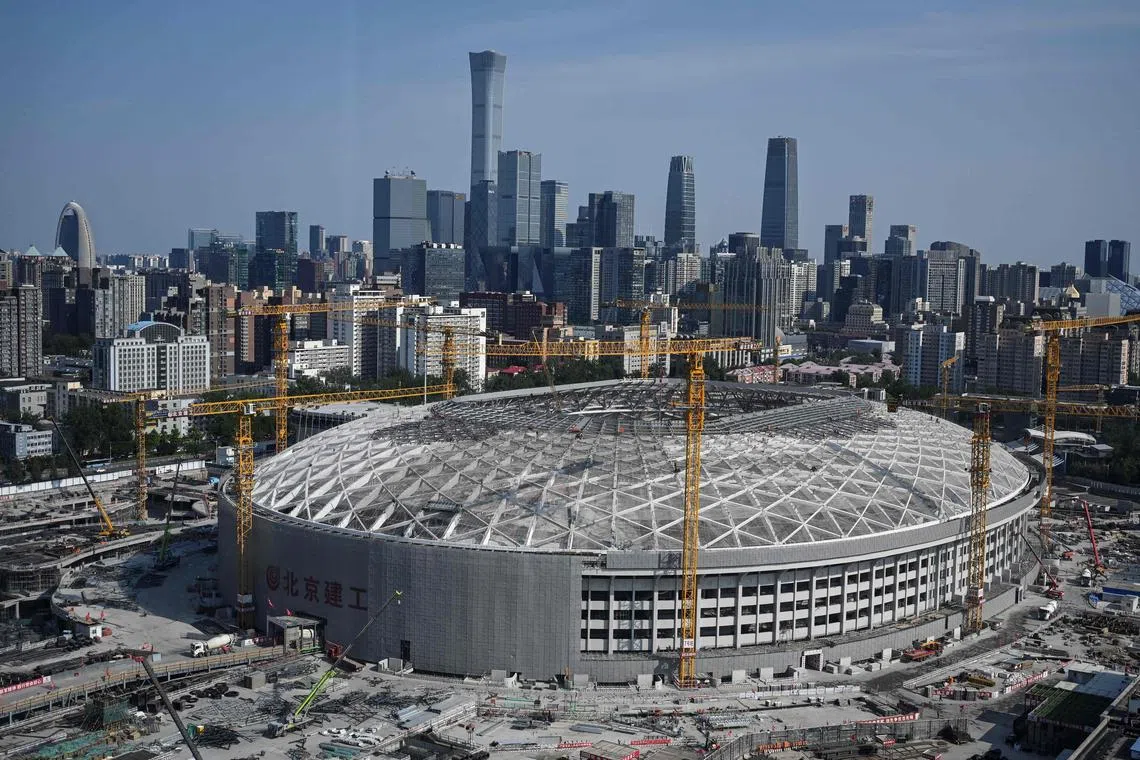Football: Corruption scandal deals new blow to Xi's Chinese dream of the sport
Sign up now: Get the biggest sports news in your inbox

A view of the construction site of the Workers' Stadium, a planned venue for the 2023 Asian Cup, in Beijing.
PHOTO: AFP
BEIJING – Alleged corruption at the top of Chinese football has left President Xi Jinping’s dream of his country becoming a global force in the sport appear more remote than ever.
China’s most powerful leader in decades is a self-proclaimed football fan and wants his nation to host and, even one day, win the World Cup.
Chinese clubs a few years ago made headlines for spending huge sums on foreign players but dozens of teams have since folded under the pressure of financial woes and zero-Covid strictures.
Now Xi’s signature anti-corruption drive has taken aim at the floundering domestic game, with at least four leading industry officials in trouble with the law
Chief among them is Chinese Football Association (CFA) head Chen Xuyuan, who is being investigated for “serious violations of discipline and the law”, according to a statement by the government’s sports agency last week, with no details given.
Former national team coach and English Premier League footballer Li Tie also fell under investigation in 2022.
The clampdown is “arguably the biggest corruption investigation ever in Chinese football”, said Beijing-based sports consultant William Bi.
The impact of the campaign could be even greater than a corruption squeeze a decade ago that laid bare cases of match-fixing, bribery and gambling, he told AFP.
Former Shanghai dockworker Chen strode in to head the CFA on a promise to launch a “new image” for Chinese football and rein in a league with a reputation for excessive spending and poor financial management.
But change was slow and the national team’s poor performances left them well short of qualifying for the 2022 World Cup, the dismal campaign costing Li his job.
China, ranked 79th in the world, have qualified for the World Cup only once, in 2002. They lost all three matches and failed to score a goal.
The 45-year-old Li is one of China’s most-capped internationals and best known for a spell with Everton in the 2000s.
He became the subject of a corruption probe in November before two other senior CFA officials – Chen Yongliang and Liu Yi – came under the microscope in January, according to official announcements.
None of the four men’s alleged offences have been officially revealed and China’s General Administration of Sport did not respond to an AFP request for comment.
The early commercialisation of elite football in China has made it “super rich in comparison with other sports” in the country, said Ping Wu, a senior lecturer in sport sociology and media studies at Britain’s University of Bedfordshire.
“Where money shines in abundance, corruption occurs frequently. This is a universal phenomenon,” she said.
Dark clouds had been gathering over China’s football industry even before the current assault on corruption, with Chinese Super League clubs ditching the free-spending culture that once lured big names such as Oscar, Hulk and Carlos Tevez.
Xi’s hallmark zero-Covid strategy, meanwhile, upended fixture lists, emptied stadiums and p rompted the cancellation of international events such as the Asian Cup
“Many teams are struggling in financial difficulties and most teams have payments in arrears,” said Bi.
“It’s a stark contrast with the gold rush of seven or eight years ago.”
There is “no doubt” the country is lagging behind in its ambition to become a major football power, he said, adding: “The development of Chinese football has reached a new low.”
Simon Chadwick, professor of sport and geopolitical economy at the Skema Business School in Paris, said corruption was just one component of “much bigger structural and systemic problems” in the Chinese game.
He sees “a toxic mix of a heavy-handed state and speculative entrepreneurs and investors” who have tried to force its development.
“Nations normally take decades to establish the foundations for elite-level success,” he said, describing the corruption furore as a “knee-jerk response to short- and medium-term failure”.
But Wu is optimistic for the future.
“Corruption is a crisis but an investigation of corruption is not,” she said. “Rather, the ongoing investigations demonstrate the Chinese government is taking actions to clean up the mess.”
And despite major shortcomings on the pitch, “China has become a mighty power in football sponsorship”, Wu said.
She expects the country to make a stronger push for qualifying for the expanded 2026 World Cup and will likely host the tournament in the near future.
“Hosting the World Cup Finals will drive the healthy development of men’s football in China,” she added. AFP


